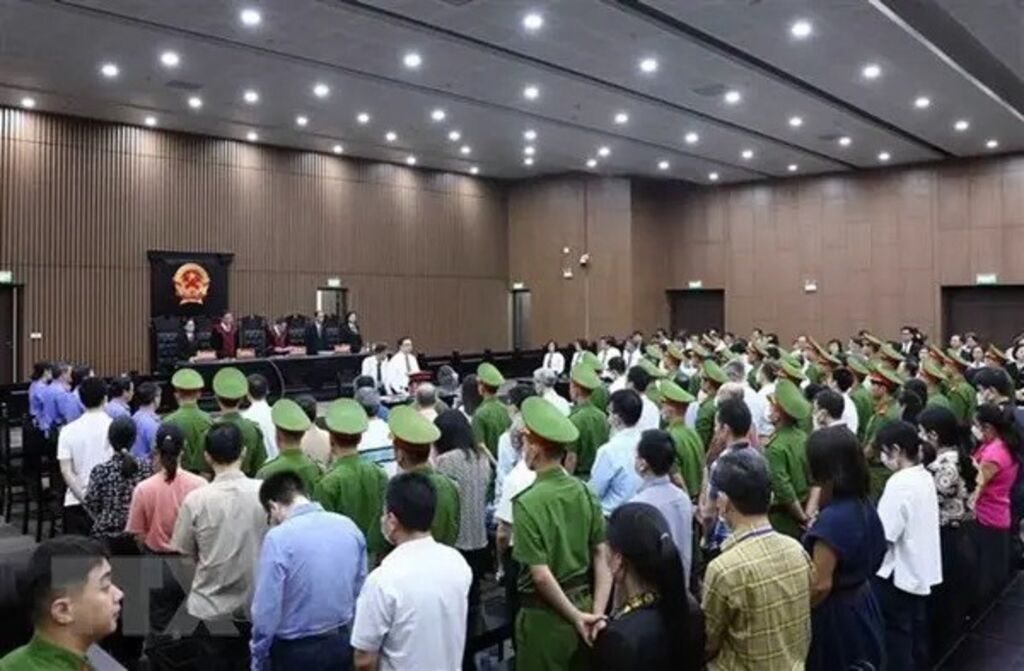 |
| At the court for the "repatriation flight" case.__Photo: VNA |
The Politburo has issued Regulation No. 132-QD/TW (Regulation No. 132), dated October 27, 2023, on controlling power, preventing and combating corruption and other negative phenomena in investigation, prosecution, judgment, and execution.
Many officials, Party members, and residents in Hanoi have supported and highly valued the issuance of the document, considering this a new step in the work.
Notably, the regulation stresses that integrity and uprightness of officials should be put at the top place.
Maximum transparency in procedural activities
Pham Van Dung, senior prosecutor and deputy head of the Department of Public Prosecutions and Supervision over the Investigation of Corruption and Position - Related Crimes (V5) at the Supreme People’s Procuracy, held that the State is on a roadmap to gradually stabilize the lives of public servants in general and judicial officials in particular, and limit negative phenomena.
Judicial officials themselves are empowered to handle issues regarding human rights, citizens’ rights and the political life of others, requiring them to perform the assigned tasks in tandem with ensuring the political life of those subject to investigation, prosecution, trial and execution, he continued.
To that end, Dung emphasized, their integrity and uprightness must be taken as the top criteria to ensure transparency in both leadership and task fulfillment.
To prevent and minimize corruption and other negative phenomena in investigation, prosecution, trial and judgment enforcement, he suggested a mechanism to force judicial officers “don't dare to and can't” get involved in negativity.
He elaborated that the State’s set of institutional tools, including Party disciplines, administrative fines and criminal sanctions, will serve as obstacles for officials from committing corruption and other negative acts.
Besides, it requires transparency in judicial activities and internal transparency, Dung said, noting that once procedural activities are transparent and there is a stringent power control mechanism, corruption and negativity will be hard to sprout.
He took the example of the process of investigation and interrogation, during which two prosecutors and one investigator are deployed at the same time to make sure that it takes place transparently.
The main prosecutor of a case that wants to summon defendants or those involved must follow the control mechanism, Dung said, adding that the summon must be kept by archives offices to facilitate the management of leaders.
This also allows investigation and supervision activities to be conducted in an open mechanism, without hindrance or affecting the work progress, but still clear and transparent, according to the official.
President Ho Chi Minh asked prosecutors to be “fair, straightforward, objective, cautious and modest”. The standard of "fairness" requires them to always be fair and wise in their work, neither for financial, material, personal purposes nor other influences to go against the law.
Following the late President’s teachings, many prosecutors and judicial officials in general have strived to improve themselves, yet there still remain judicial officers who take advantage of their law understanding to commit embezzlement and corruption. They should be handled at a higher level than others.
According to Dung, handling judicial officers for their negative and corrupt acts has exerted different impacts in short and long terms.
In the short term, it affects the reputation of the sector and other judicial officers, and stir up public opinions. However, if considered from a long-term perspective, it will be very good, helping to purify the contingent of officials with wrongdoings, raise the awareness among judicial officials, and build trust among the public, he elaborated.
Stepping up supervision, social criticism
Dr. Nguyen Quoc Viet, Deputy Director of the Institute of Economic and Policy Research under the University of Economics and Business, the Vietnam National University - Hanoi, said it is necessary to increase transparency and expand the participation of parties in procedural activities.
For transparency, Viet stressed the need to raise the quality of debates at trial through lawyers, and consider enhancing independence in legal proceedings, ensuring enough income for judicial officials to maintain their integrity.
In particular, judicial officials must ensure that they are not dependent on political influence in relations with their leaders and colleagues. To do this, Viet said, the best tenure for them is permanent.
Regarding expanding the participation of parties in procedural activities, he suggested piloting the partial socialization of judicial activities, such as notary services.
Except for the crimes of infringing on national security and other specific crimes related to private secrets and traditional customs, among others, journalists should have better and earlier access in the process of investigation and information collection, he said.-(VNA/VLLF)









